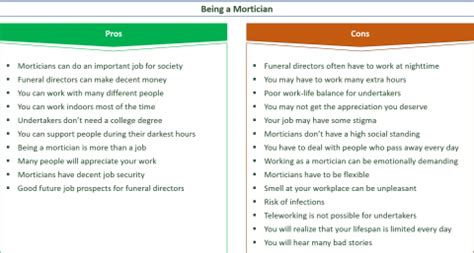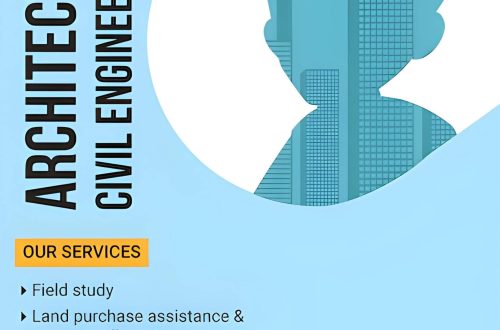Mortician Pros And Cons: Duties And 10 Considerations

Death is a natural part of life, and morticians play an essential role in helping families cope with the loss of their loved ones. Morticians, also known as funeral directors or undertakers, provide funeral and burial services, such as embalming, cremation, and burial arrangements. While this profession can be rewarding, it also has its share of challenges. In this article, we’ll explore the pros and cons of being a mortician and provide 10 considerations for anyone considering this career path.
Pros of Being a Mortician
1. Fulfilling Career
Morticians play a vital role in helping families say goodbye to their loved ones. They provide comfort and support during a difficult time, and many find this work to be incredibly rewarding.
2. Job Security
Death is a fact of life, and as long as people continue to pass away, there will be a need for morticians. This means that job security is high in this field.
3. Good Salary
According to the Bureau of Labor Statistics, the median annual salary for morticians is $58,000, which is higher than the median salary for all occupations.
4. Diverse Work Environment
Morticians work in a variety of settings, including funeral homes, hospitals, and morgues. This means that there are many opportunities for those who want to work in this field.
5. Flexibility
Many morticians work irregular hours, which can be a plus for those who prefer a non-traditional work schedule. Additionally, some morticians work part-time or on a freelance basis, providing even more flexibility.
Cons of Being a Mortician
1. Emotional Strain
Morticians deal with death on a daily basis, which can be emotionally draining. This can take a toll on even the most seasoned professionals.
2. Long Hours
Many morticians work long hours, including nights, weekends, and holidays. This can make it difficult to maintain a work-life balance.
3. Physical Demands
Morticians may be required to lift heavy objects, such as caskets, and stand for long periods of time. This can be physically demanding and lead to back problems and other health issues.
4. High Stress Levels
Morticians are responsible for coordinating complex events, often with grieving families. This can be stressful and requires excellent communication and organizational skills.
5. Exposure to Hazardous Materials
Morticians work with hazardous materials, such as embalming fluid, which can be dangerous if not handled properly. This requires strict adherence to safety protocols.
10 Considerations for Being a Mortician
1. Educational Requirements
To become a mortician, you will need to complete a degree program in mortuary science and pass a licensing exam. This typically takes 2-4 years to complete.
2. Licensing Requirements
Each state has its own licensing requirements for morticians. Be sure to research the requirements in your state before pursuing this career.
3. On-the-Job Training
Many morticians receive on-the-job training before they are fully licensed. This can be a valuable learning experience and can help you build relationships in the field.
4. Specialization
Some morticians choose to specialize in a particular area, such as cremation or green burials. This can help you stand out in a competitive job market.
5. Business Skills
Morticians are often responsible for managing the business side of a funeral home, including accounting and marketing. Be sure to develop strong business skills if you want to succeed in this field.
6. Interpersonal Skills
Morticians work closely with grieving families, and excellent interpersonal skills are essential for success in this field. Be sure to develop strong communication and empathy skills.
7. Attention to Detail
Morticians are responsible for ensuring that every aspect of a funeral or burial goes smoothly. This requires excellent attention to detail and organizational skills.
8. Physical Fitness
Morticians may be required to lift heavy objects, such as caskets, and stand for long periods of time. Be sure to maintain good physical fitness to avoid health problems.
9. Compassion and Empathy
Morticians work with families during a difficult time, and compassion and empathy are essential for success in this field. Be sure to develop these qualities to provide the best possible service.
10. Continuing Education
The funeral industry is constantly evolving, and it’s important to stay up-to-date on the latest trends and technologies. Be sure to participate in continuing education programs to stay ahead of the curve.
Conclusion
Becoming a mortician can be a rewarding career, but it’s important to consider the pros and cons before making a decision. By understanding the demands of the job and developing the necessary skills, you can succeed in this field and provide comfort and support to grieving families.
FAQs
What is the difference between a mortician and an embalmer?
A mortician is responsible for overseeing all aspects of a funeral or burial service, while an embalmer is responsible for preparing the body for burial.
How long does it take to become a mortician?
It typically takes 2-4 years to complete a degree program in mortuary science and become licensed as a mortician.
What are the working conditions like for morticians?
Morticians may work irregular hours, including nights, weekends, and holidays. They may also be required to work in a variety of settings, including funeral homes, hospitals, and morgues.
What skills are essential for success as a mortician?
Strong communication, empathy, attention to detail, and physical fitness are all essential skills for success as a mortician.
How can I find a job as a mortician?
You can search for job openings online or through professional organizations, such as the National Funeral Directors Association.

